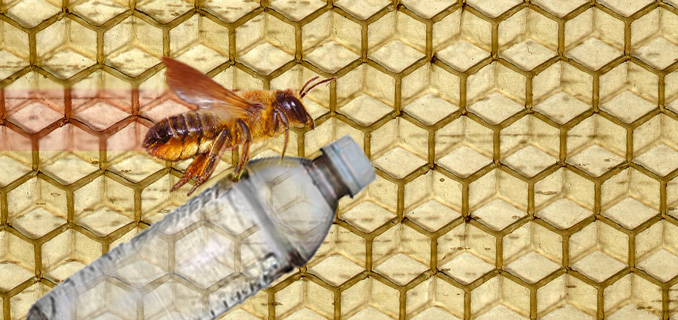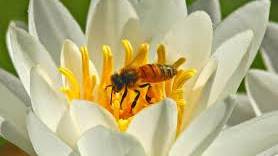In urban areas bees are making hives out of plastic

A new study has been released that shows that bees in urban areas are building their nests out of plastic.
The study observing the ecology of modern bees, as reported in EcoSphere, has surprised the scientific community with its findings.
"Bee nests are sometimes constructed within hollow twigs or other similarly constricted natural cavities, but often are in burrows in the ground." (Source) Traditionally these leafcutter bees would make their nests exclusively out of leaves and plant resin.
The University of Guelph study shows that bees are demonstrating surprising adaptability to their modern environment and are making use of the tools at hand. Moreover, scientists suggest that while a plastic-rich environment is often detrimental to the well-being of plants and animals, the polyurethane parts of the bees’ nests are creating a barrier to parasites, allowing the larva to thrive.
ZME Science reports that "[...]the bees actually manipulated the plastics differently. It’s not like they mistook it for plants – they actively sought it and developed a new mechanism to process it for their nests. Markings showed that the bees chewed the plastic differently than they did leaves, nor were the leaves hard to come by in their nests’ vicinity."
NewsDaily has more on the research:
It’s an important discovery because it shows bees’ resourcefulness and flexibility in adapting to a human-dominated world, says lead author Scott MacIvor, a doctoral student at York University and a 2008 U of G graduate.
[...]Figuring out that the bees were using plastics in place of natural materials took some detective work by U of G’s Andrew Moore, supervisor of analytical microscopy at Laboratory Services.
Moore analyzed a grey "goo" that MacIvor discovered in the nests of one kind of bee, Megachile campanulae, which uses plant resins to build its nests,
"Scott thought it might be chewing gum originally," Moore said. His team uses a scanning electron microscope to take highly detailed pictures of items, x-ray microanalysis to determine the elements in the sample and infrared microscopy to identify polymers. They can distinguish the finest detail on the surface of an animal hair.
Turns out that M. campanulae was occasionally replacing plant resins with polyurethane-based exterior building sealant, such as caulking, in its brood cells--created in a nest to rear larva.
The researchers also discovered another kind of bee, Megachile rotundata, an alfalfa leafcutter, was using pieces of polyethylene-based plastic bags to construct its brood cells. The glossy plastic replaced almost one-quarter of the cut leaves normally used to build each cell.
Markings showed that the bees chewed the plastic differently than they did leaves, suggesting that the insects had not incidentally collected plastic. Nor were leaves hard to find for the bees in the study.
"The plastic materials had been gathered by the bees, and then worked -- chewed up and spit out like gum -- to form something new that they could use," Moore said.
Source
While the researchers seem to be congratulating the bees on their resourcefulness, further study should be done to evaluate the long term effects of plastic nests on the bees and larva. Modern plastics are loaded with chemicals and other toxic elements:
Previous studies have reported that bisphenol A (BPA), found in the liners of some food cans, feeding cups, and baby bottles, has a similar molecular structure to estrogen and therefore affects sex hormone signaling in laboratory animals.
BPA exposure is also associated with thyroid hormone disruption, altered pancreatic beta-cell function, cardiovascular disease and obesity in humans.
According to the study published in the Environmental Health Perspectives, BPA exposure in men is linked with elevated blood levels of the male sex hormone testosterone, a condition which may contribute to increased risk of heart disease and certain cancers in men.
"BPA is what’s known as an anti-androgen. That means that it blocks the normal action of testosterone in the body and what we might be seeing is the body making more testosterone to overcome this," said lead researcher Tamara Galloway.
Source
Plastic pollution can release harmful chemicals into the ground and water, poisoning both animals and humans alike.
Are polyurethane-based plastics being used by other species of bee to make honey, and could there be contamination of the honey from the plastic nest ’goo’? Could the chemicals affect the bees as well as the animals (and humans) who eat the honey?
Bees, especially in the western world, have been struggling with the little-understood Colony Collapse Disorder - mass die offs which researchers suspect is a result of widespread pesticide use.
These changes in the traditional behaviour of the bees comes after a study warning that bees are ’shrinking’ due to pesticides, and thus may be becoming less effective at harvesting honey and pollination.
Is this ’resourceful adaptation’ to the modern plastic-strewn human urban landscapes keeping the bees alive in the short term while increasing the likelihood of dire problems in the future?
By Elizabeth Leafloor, Red Ice Creations






















